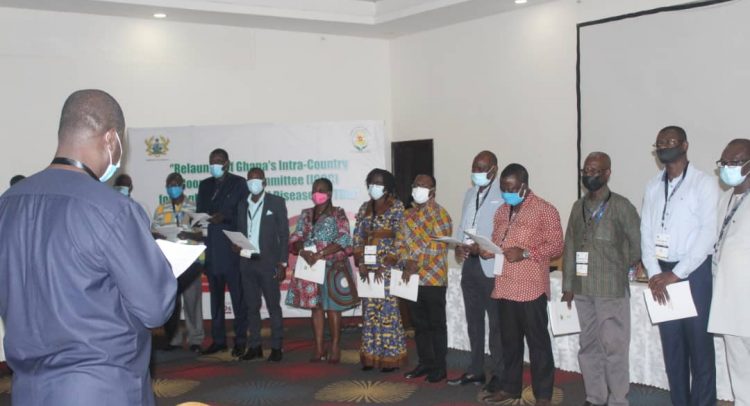The ICCC members being sworn-in
The Ghana Health Service (GHS) has re-launched the Intra-Country Coordinating Committee (ICCC) for NTDs.
The move is to help strengthen the integration of NTDs programme into national health system and policies.
The ICCC, a country–driven multi-sectoral coordination mechanism of relevant stakeholders, will engage key sectors across government ministries and departments as well as stakeholders to sustain the fight for the elimination of NTDs in the country.
The Minister of Health, Kwaku Agyeman-Manu, speaking at the inauguration of the ICCC in Accra said it was necessary as the country to build relevant mechanisms towards strengthened cross-sector partnerships and sustainability in NTDs for broader health programming.
“This fits into the larger national framework of President Nana Akufo Addo’s ‘Ghana Beyond Aid’ agenda,” the Minister, stated.
He said though the country had made significant strides towards the control and elimination of NTDs, there was still much to be done to achieve the World Health Organization’s elimination and control target by 2030.
The Minister stated that the emergence of the Covid-19 pandemic globally had reiterated the need for multi-sector coordination and collaboration within and outside the health community.
Mr Agyeman-Manu said it was government’s hope that members of the committee, drawn from various relevant sectors would contribute towards sustainability in NTD programming in Ghana.
Director-General of the GHS, Dr Patrick Kuma Aboagye, said the Committee formed a critical component of relevant sector participation in ensuring sustainability in activities towards the control and elimination NTDs.
He said more than one billion people, one-seventh of the world’s population, suffered from one or more NTDs, therefore, having the Committee was appropriate and timely due to the collapse of the previous one launched in 2013.
Dr Aboagye said the three sub-committees- Technical, Advocacy, Communication, as well as Resource Mobilization, would sit under the ICCC governance body.
He said there was evidence that water, sanitation, and hygiene (WASH) played a major role in addressing the concerns, thus, the need to identify best practices for collaborative programming.
“This will identify the most effective, sustainable, and scalable methods of integrating WASH and NTDs control activities,” he added.
NTDs Ambassador, Dr Mrs Joyce Aryee, urged the committee to work towards the realization of the total eradication of NTDs by 2030.
By Jamila Akweley Okertchiri


